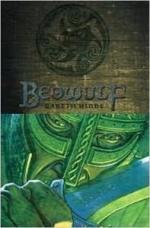The lord of the Geatmen uplifted his hand then,
Smiting the fire-drake with sword that was precious,
That bright on the bone the blade-edge did weaken,
Bit more feebly than his folk-leader needed,
115 Burdened with bale-griefs. Then the barrow-protector,
{The dragon rages}
When
the sword-blow had fallen, was fierce in his spirit,
Flinging
his fires, flamings of battle
Gleamed
then afar: the gold-friend of Weders
{Beowulf’s sword fails him.}
Boasted
no conquests, his battle-sword failed him
120 Naked in conflict,
as by no means it ought to,
Long-trusty
weapon. ’Twas no slight undertaking
That
Ecgtheow’s famous offspring would leave
The
drake-cavern’s bottom; he must live in some region
Other
than this, by the will of the dragon,
125 As each one
of earthmen existence must forfeit.
’Twas
early thereafter the excellent warriors
{The combat is renewed.}
Met
with each other. Anew and afresh
The
hoard-ward took heart (gasps heaved then his bosom):
{The great hero is reduced to extremities.}
Sorrow
he suffered encircled with fire
130 Who the people
erst governed. His companions by no means
Were
banded about him, bairns of the princes,
{His comrades flee!}
With
valorous spirit, but they sped to the forest,
Seeking
for safety. The soul-deeps of one were
{Blood is thicker than water.}
Ruffled
by care: kin-love can never
135 Aught in him
waver who well doth consider.
[88]
[1] The clause 2520(2)-2522(1), rendered by ‘Wist I ... monster,’ Gr., followed by S., translates substantially as follows: If I knew how else I might combat the boastful defiance of the monster.—The translation turns upon ‘wiethgripan,’ a word not understood.
[2] B. emends and translates:
I will not flee the space of a foot
from the guard of the barrow,
but there shall be to us a fight at the
wall, as fate decrees, each
one’s Creator.
[3] The translation of this passage is based on ‘unslaw’ (2565), accepted by H.-So., in lieu of the long-standing ‘ungleaw.’ The former is taken as an adj. limiting ‘sweord’; the latter as an adj. c. ‘gueth-cyning’: The good war-king, rash with edges, brandished his sword, his old relic. The latter gives a more rhetorical Anglo-Saxon (poetical) sentence.
XXXVI.
WIGLAF THE TRUSTY.—BEOWULF IS DESERTED BY FRIENDS AND BY SWORD.
{Wiglaf remains true—the ideal Teutonic liegeman.}




